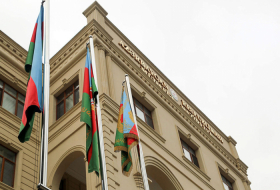Mistake of the U.S. in the Caucasus: Armenia and Azerbaijan in a single mould

Dire consequences of erroneous geopolitics
Truth prevails, sooner or later, and it is not just a rule applicable in a daily life. It is relevant in high-level politics, international relations and geopolitics in general. There has to be an end to the centuries-old unjust attitude towards the people of Azerbaijan and signs of that are becoming more apparent.
One of the renowned analysts of the West and author of the book titled "World Island: Eurasian Geopolitics and the Fate of the West``, Alexandros Petersen released an article called "Contrast in the Caucasus``, published in "The National Interest`` (See: Alexandros Petersen. Contrast in the Caucasus / www.nationalinterest.org, 07 October, 2013). Author focuses on some thought-prooking aspects with regard to the geopolitical picture in the South Caucasus. Those and other delicate aspects of international geopolitics deserve detailed analysis.
A.Petersen views this region as one system. Azerbaijan, Armenia and Georgia are analyzed in a closely linked manner while recognizing that each performs an individual geopolitical role. Therefore, pursuit of different policies on Azerbaijan and Armenia is deemed suitable. Interestingly, author avoids mentioning Georgia in this context, something to be considered a shortcoming of the article. Nevertheless, description of the Western policies with regards to Armenia and Azerbaijan sheds some light on the issue of Georgia. Thereby, general public is exposed to some insightful and otherwise clandestine elements of the U.S. policies regarding each country of the South Caucasus.
"Post-Soviet space`` is one the most common terms encountered in the Western geopolitical terminology. Application of the term implies placing all of the independent countries of this geography into a "single mould``. Common approach based on some manufactured factors is demonstrated with regards to all the countries as opposed to the need of differentiated policies underpinned by the realities. Such a policy had already produced controversy, and Western diplomacy fails to address the issue. That in turn, only erodes the geopolitical influence of the West in the very "post-Soviet space``.
For example, there is no set of criteria to underpin the approach to the conflicts here. Although declarations are made about just attitude to all the conflicts, the realities attest to the contrary. Positions of the U.S. and the European Union are not limited to explicit recognition of the occupation of Georgia`s two regions; they are actively advocating Tbilisi`s position.
We believe it is perfectly appropriate. However, when it comes to the occupied territories of Azerbaijan, the situation becomes slightly different. Verbal declarations for the support of Azerbaijan`s position are voiced, and Azerbaijan`s territorial integrity is recognized by the international documents. Nevertheless, no action is taken against Armenia. Armenia is yet to be harshly demanded to withdraw from the occupied territories.
Petersen explicitly recognized that Armenia is being lobbied in the U.S. Congress. Still, he underscored that it was wrong to interconnect policies on Armenia and Azerbaijan. A valid question is asked: "…Why, then, does the United States continue to lump Armenia and Azerbaijan together when their strategic importance to Washington is completely imbalanced?`` We understand the problem rests with the answer to this question.
From double standards to the fair strategy
Double standards used by the Western powers, spearheaded by the U.S., are to blame. Criteria deemed suitable for one situation may prove to be inappropriate for another, albeit similar situation. Presumably, Israel may produce nuclear arms capabilities while Iran must not. Here is another one. Armenia has driven all non-Armenians away from the country. Sanctions imposed against official Yerevan - none. Armenian authorities were never questioned about depriving ethnic minorities of their natural right to live in the country.
Conversely, Azerbaijan and Turkey are expected to bring clarity to every minor incident. Nobody investigates the fate of the mosques in Yerevan while there is frenzy about the fate of churches in the Muslim countries. Havoc is provoked in Iraq, Egypt, Syria and elsewhere; compelling people to clash based on religion, denomination and ethnicity. Strife is sown in various societies. In the meantime, they strive for unity in such an aggressor state as Armenia. Why is there a difference?
Osama Bin-Laden, Muammar Gaddafi and Saddam Hussein were discovered in most secret hideouts, but for some mysterious reason Azerbaijanis kept in captivity and subjected to torture in Armenia are yet to be "found and rescued`` by the Western intelligence services. Surely, the motives of those standards are known. What we want to emphasize is that even the Western analysts tend to address those issues lately. Is not it too late? Have not the Western political circles gone too far already?
Still, introduction of two changes are noticeable in the political dictionary. First is the lack of appreciation for Azerbaijan`s participation in the international events. Baku has been known for its commitment to international anti-terrorism operations led by the West, and programs and initiatives to ensure energy security. In Afghanistan, one of the crucial issues for the U.S., Baku also positively contributes to the cause in line with the law. In exchange, Baku sees no actions aimed at restoration of Azerbaijan`s territorial integrity. Not only that Baku has to confront the efforts of those pressuring Azerbaijan, but some quarters of the West are even supportive of that. Fresh are the memories of German media`s behavior in the run up to the "Eurovision`` song contest.
Second, they admit that Azerbaijan is the only country of the South Caucasus to conduct an independent foreign policy. As Petersen noted, Armenia was able to establish close international ties with only Russia and Iran. Thus, Azerbaijan is the exclusive partner of the West, in geopolitical terms. Nevertheless, Brussels and Washington patronize Armenia, evidence to the contradictions in the Western foreign policy.
Geopolitical situation in the region requires new approaches. The West must ultimately take realities into account and start employing differentiated policy in relations with the countries of the South Caucasus. The West would be the first to benefit because Azerbaijan has proven to be a reliable partner and intends to display an enduring commitment to the course. Outcome of the presidential elections held in the country was a tribute to that reality. Citizens of Azerbaijan voted for the incumbent President Ilham Aliyev. That implies a continuation of the geopolitical course by the official Baku.
Azerbaijan was able to establish mutually beneficial cooperation with all regional states. Russia, Iran, Turkey and Georgia are extremely keen to develop those ties. Experience shows that it is the reality that underlies the foreign policy of Azerbaijan. National interests of the country are upheld in line with the geopolitical parameters of the modern world.
Both Washington and Brussels must consider those aspects. Otherwise, their enduring presence in the South Caucasus would be inconceivable. Therefore, we may expect some actions by the West towards just and fair resolution of the Nagorno Karabakh conflict – a change that may positively affect the geopolitical landscape in the region.















































